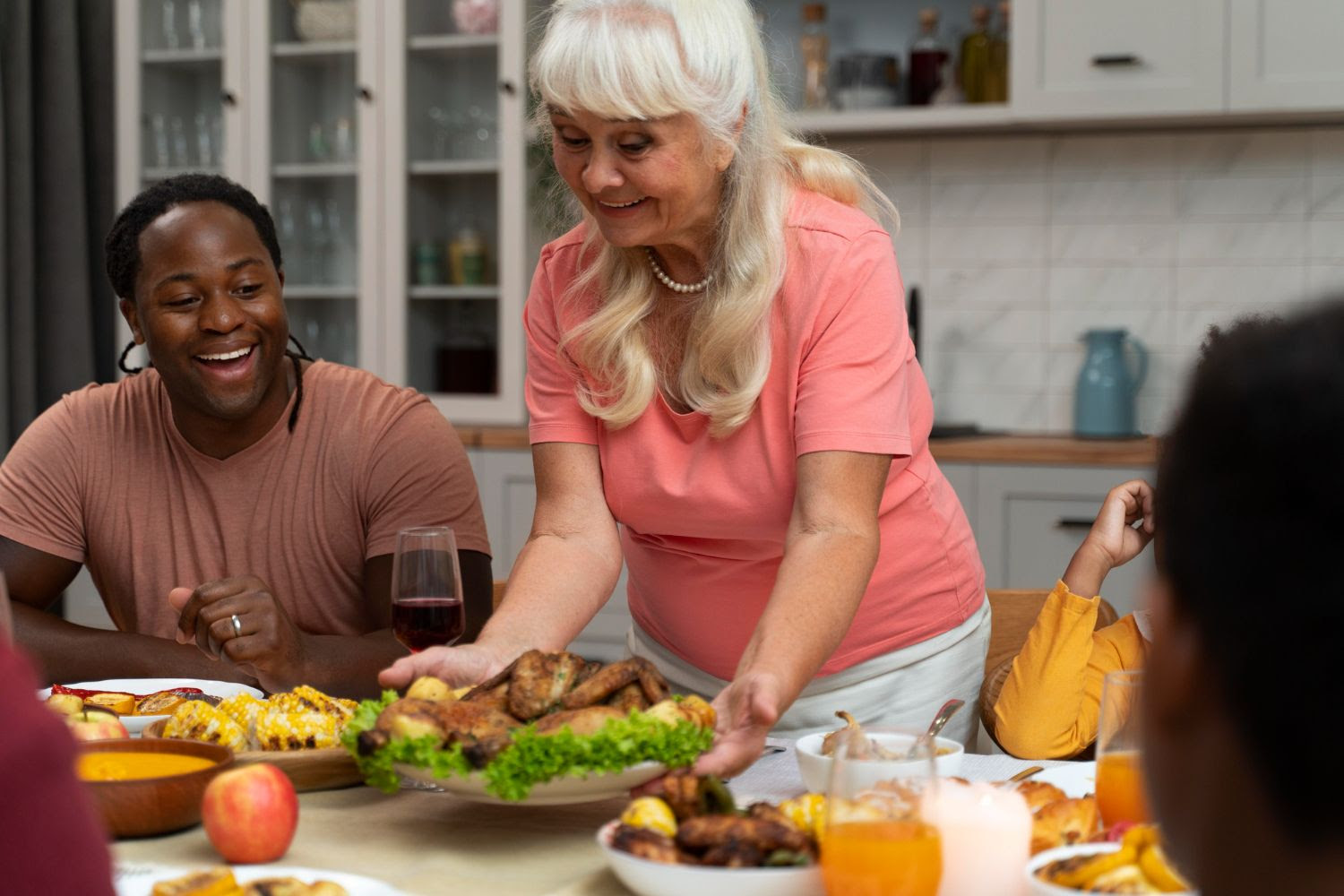7 Ways to Practice Mindful/Intuitive Eating
With the holidays on its merry way starting with Thanksgiving, it’s important to practice mindful or intuitive eating. When we apply principles of awareness and intuition to our food choices, we are able to feel better about ourselves. According to VerywellFit here’s the difference between mindful and intuitive eating as well as ways to incorporate both eating styles so you can truly enjoy the day and all its edible delights.
Mindful eating is any effort to bring the principles of mindfulness to our food consumption. Being in the present moment as we eat, savoring tastes and textures, and reducing distractions are all hallmarks of a mindful meal.
Intuitive eating, on the other hand, is a trademarked program developed by dietitians Elyse Resch and Evelyn Tribole. It revolves around 10 key principles, such as rejecting the diet mentality, respecting your body, and making peace with food. These practices aim to unravel and heal unhealthy relationships with food.

Slow Down and Savor
T...
Garlicky Green Beans Almandine with Lemon

Ingredients:
- Equal parts water and vegetable broth (see step 1 below)
- 2 pounds green beans, ends cut off
- 3/4 cup slivered raw almonds
- 4 cloves fresh garlic, peeled & minced
- 3 tablespoons fresh lemon juice
- 2-3 tablespoons coconut oil
- 1/2 teaspoon finely grated lemon zest
- Sea salt, to taste
Instructions:
- Fill a large stock pot with half water, half vegetable broth and bring it to a boil. Make sure the amount of water/broth is at least twice as much as the amount of beans you intend to cook.
- Gently blanch the green beans (cook them in the boiling liquid for about 3 minutes until just al dente (brightly colored and crisp)). Drain beans in ice cold water (or put them in a bowl containing an ice water bath and set aside). This stops the cooking process.
- In a wok or large deep frying pan, heat the oil and garlic on medium heat for 2-3 minutes. Don’t let the garlic brown.
- Add in the almonds and stir for about a minute. Then mix in the lemon juice and finely grated lemon zest ...
Different Types of Rest We Need
Our bodies need food, movement and rest. Rest, however, is not just about sleep. According to Dr. Saundra Dalton-Smith, there are seven different types of rest your body needs to keep your energy levels and mental capacity high. They are:
- Physical rest
- Mental rest
- Social rest
- Spiritual rest
- Sensory rest
- Emotional rest
- Creative rest
How do we know if we need more rest? Health expert JJ Virgin gives us the symptoms and breaks down the different types of rest we need.
Before we dive deeper into the different types of rest, let’s look at some of the symptoms you might be feeling if you’re missing out on any of the seven:
- Feeling tired, groggy, unfocused, or cranky throughout your day, even when getting the recommended 7-9 hours of sleep each night
- Stress from feeling like your life is non-stop action and hustle from the moment you wake up till the second your head touches the pillow at night
- Achy joints or random pain without knowing where it came from
- Difficulty...
Crowd-Pleasing Cioppino

Ingredients:
- 2 tablespoons coconut oil
- 1 onion chopped
- 1 celery stalk chopped
- 3 tablespoons shallots chopped
- 1 pinch saffron
- 1 teaspoon paprika
- 1 bay leaf
- 5 garlic cloves minced
- 2 1/2 cups fresh diced tomatoes or 16-ounce can diced tomatoes with juice in a pinch (for 8 servings)
- 1 16-ounce can tomato sauce
- 3 cups vegetable broth
- 1 pound white firm fish (sea bass, halibut, cod), cubed
- 1 pound large shrimp uncooked, peeled, and deveined
- 1 pound clams or mussels
- 1/2 pound bay scallops
- salt and pepper to taste
- 3 tablespoons fresh parsley chopped
Directions:
-
In a heavy-bottomed pot, heat coconut oil over medium heat. Add onion, celery, shallots, saffron, paprika, and bay leaf. Cook for 6 minutes.
-
Add garlic, and cook for 1 more minute.
-
Add tomatoes, tomato sauce, and vegetable broth. Bring it to a boil. Reduce heat and simmer for 20 minutes.
-
Add the fish, shrimp, mussels, and scallops.
-
Season with salt and pepper. Simmer for 5 minutes or...
Emotional Health Starts With Understanding Yourself
Emotional wellness is knowing, understanding, and accepting the gamut of feelings we have and managing them effectively. One way of improving our emotional health is by understanding ourselves better. According to Psychology Today, we need to discover how and why our thoughts, emotions, and behaviors work. “Relationships either sustain us or destroy us, wreaking distress or creating joy as we move through our lives. Our first task is to figure out how our thoughts, emotions, and behaviors work within us. Then we can apply the same task to understanding how we relate or don’t relate with others in beneficial ways.” Psychology Today recommends asking the following questions:

Behaviors
Here are some examples of behavior scenarios that we can work on understanding:
- Why do you pout, go into your room, and slam the door when someone disagrees with you?
- Why do you behave rudely knowing it upsets people?
- Why do you try and do what others want when it may harm you?
- Why are you quiet whe...
Bison Stir Fry

Ingredients:
- 1 pound bison (such as New York strip steak), cut across the grain in ⅛-inch thick slices (grass-fed or pasture-raised if possible)
- ¼ cup tamari, divided
- ¼ cup avocado oil, divided
- ½ large yellow onion, diced in 1-inch cubes
- 1 large bok choy, cut into 1-inch pieces, green and white parts separated
- 1 bell pepper, thinly sliced
- 2 cups snow peas, ends removed
- 2 cups cauliflower rice
- 3 large garlic cloves, thinly sliced
- 1 tablespoon tomato paste
- ⅓ cup roasted cashews, roughly chopped
- Scallions for garnish (optional)
Instructions:
1. Preheat a cast iron skillet over medium-high heat.
2. Combine the sliced bison and tamari in a mixing bowl and allow it to marinate while preparing the ingredients.
3. Once the pan is hot, add half of the oil, the onions, and the white parts of the bok choy. Sauté for 2 minutes.
4. Once the onions begin to brown, add the bell peppers and continue to sauté for another minute.
5. Add the snow peas and sauté for 2 minutes, then ...
Exercise Mistakes You Might Be Making
Whether you’re a newbie or veteran at exercising, you’ll need to watch out for exercise mistakes that impact your workout’s effectiveness. Health expert JJ Virgin shares the top five to look out for and what to do about it.

1. Overdoing Cardio and Neglecting Strength Training
Like acid-washed jeans and bleached hair, the cardio-obsessed 80s have faded away. Yet even today, I see folks trudging on the treadmill, usually thumbing through a magazine or catching up on Real Housewives on that little TV screen. I want to gently guide these folks into the weight room. Strength training does so many things, including boosting metabolism, increasing bone density, and steadying blood-sugar levels.
As you get older, muscle becomes critical: once you turn 30, muscle mass begins to decrease about 3-8% every decade. After 60, that loss becomes even higher. During prolonged periods of cardio, your body may start breaking down muscle tissue for energy. Some types, including running or cycling, can ...
Foods to Help With Anxiety
Last week we learned about strategies to deal with anxiety. But did you know that food can also help with alleviating anxiety? When we experience chronic stress and anxiety, it causes our bodies to react and create chronic inflammation. Gastrointestinal problems increase and our immune system goes into overdrive making it harder to fight an infection. Taking the right food can be part of our defense against the effects of stress and anxiety. Health expert JJ Virgin shares with us some of the top foods that can help do this.

1. Ginger
In the context of mental health, ginger is a great go-to for managing nausea if you’re experiencing anxiety that’s creating an upset stomach.It also has anti-inflammatory effects, helping reduce the increased inflammation that anxiety and stress can bring on. Plus, studies in animals have found that ginger can protect the brain against anxiety-related oxidative stress, as well as regulate feel-good serotonin levels to restore the imbalance that anxiety c...
The Benefits of Being Kind
These days the world tells us to look out for our own interests. But did you know that putting other people’s interests first has many health benefits? Being kind is actually good for us and not just for the one who benefits from our kindness. Psychology Today lists some of the side effects of being kind and sincere:

1. Acting kindly makes us feel good.
It feels wonderful to do something useful for someone. The “helper's high” is the uplifting feeling that we experience after doing an act of kindness to others. The “helper’s high” shows up in our brain’s reward system. The experience is like consuming a piece of chocolate cake or having a pleasant surprise. It feels so good that the brain motivates us to do them again and again. As the proverb goes, it’s better to give than to receive. It makes you feel like your life is valuable.
2. Kindness is contagious.
Kind acts can have a ripple effect—for example, giving a genuine compliment to a family member, friend, or colleague. When peopl...
Motivation Starts With Vision
In his book, Finding the Life You’ve Always Wanted, best-selling author John Ortberg uses a sports metaphor to explain a tried and true method to maximizing your motivation.
He says, “Suppose you woke up tomorrow morning and decided to run a marathon. You put on some running shoes, don the right apparel, and head out the door to begin your 26.2 mile run. Could you do it? What if you tried hard? Really, really hard? If you gave it the ole’ 110%? The obvious answer is, for most of us would be no, of course not.”

“Too often, we “try to do better” in an area of life. The problem is that trying won’t get us any closer to our goals. Only training will do that.”
No matter how hard we try, most of us couldn’t simply head out the door and run 26.2 miles. If we want to run a marathon, we’re going to have to train for it. Effort alone just won’t cut it.
But what if you woke up each morning and trained to run a marathon by following an exercise program, a running schedule, and a recovery sch...

